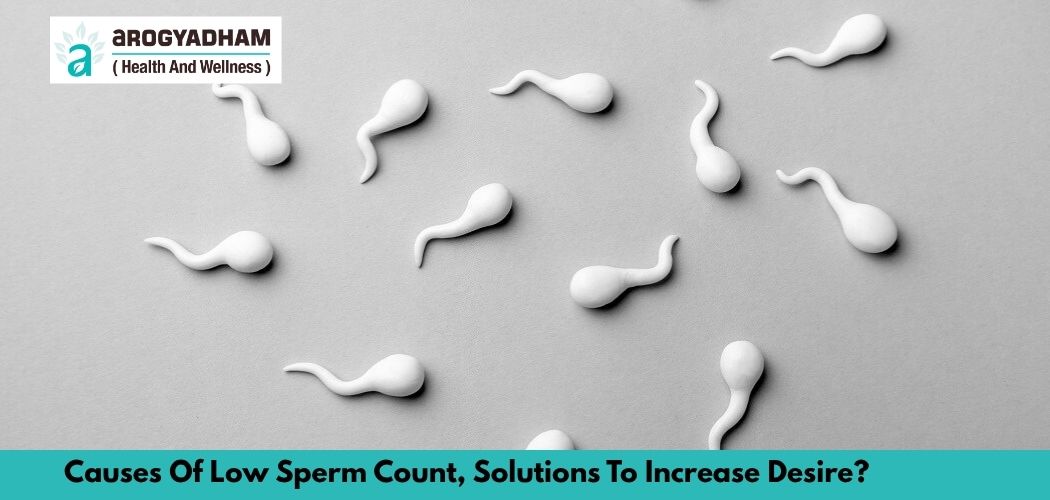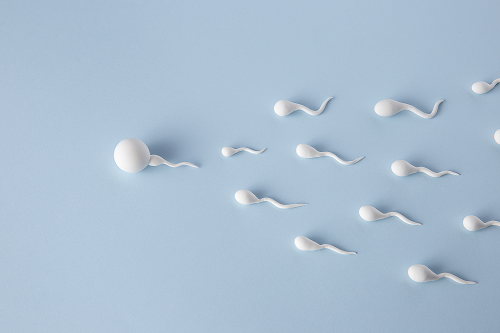Causes Of Low Sperm Count, Solutions To Increase Desire?
- Home
- /
- Sexual Diseases
- /
- Causes Of Low Sperm...

What is Low Sperm Count or Oligospermia?
Low sperm count means the fluid called semen that is ejaculated during an orgasm contains fewer sperm than usual. This condition can lead to complications in achieving pregnancy. Low sperm count, or oligospermia, occurs when a person’s sperm count is lower than 15 million sperm per millilitre of semen. An entire absence of sperm is referred to as azoospermia. Fortunately, there are several ways to increase low sperm count, including lifestyle changes, such as a healthy diet, regular exercise, avoiding smoking and excessive alcohol consumption, and managing stress. Certain medical treatments and supplements may also help boost sperm production and improve fertility.

It decreases the possibility of one of the sperm fertilising the partner’s egg, resulting in pregnancy. However, there are many men with low sperm counts able to father a child. But most of the time, it appears to be a complication of pregnancy.
Causes of Low Sperm Count
- Hormonal Imbalances: Hormonal imbalances, particularly involving testosterone and other hormones, play a significant role in low sperm count. Conditions such as hypogonadism (low testosterone production) or hyperprolactinaemia (high prolactin levels) can affect sperm production and quality.
- Medical Conditions: Certain medical conditions can negatively impact sperm count. Diabetes, varicocele (enlarged veins in the scrotum), and infections such as epididymitis or sexually transmitted infections (STIs) can contribute to decreased sperm production and quality.
- Lifestyle Factors: Lifestyle choices significantly impact sperm health. Excessive alcohol consumption, smoking, and the use of recreational drugs can impair sperm production. Additionally, exposure to environmental toxins and pollutants and excessive heat from frequent hot baths or saunas can negatively affect sperm count.
- Poor Diet and Nutrition: A diet lacking essential nutrients can contribute to low sperm count. Deficiencies in vitamins and minerals such as zinc, selenium, and vitamins C and E can impact sperm production and quality. A poor diet high in processed foods and low in antioxidants can also have detrimental effects.
- Stress and Psychological Factors: Chronic stress and psychological factors like anxiety and depression can disrupt hormonal balance and affect sperm production. Emotional stress can elevate cortisol levels, hurting testosterone levels and sperm count.

Symptoms of Low Sperm Count
- Difficulty in conceiving a child
- Reduced libido or sexual desire
- Pain or swelling in the testicles
- Abnormal discharge from the penis
Solutions to Increase Low Sperm Count and Desire
1. Lifestyle Modifications
- Quit Smoking and Reduce Alcohol Intake: Eliminating smoking and moderating alcohol consumption can improve sperm quality and count.
- Exercise Regularly: Regular physical activity promotes overall health and can help increase sperm count. Aim for moderate exercise, as excessive exercise may have the opposite effect.
- Avoid Heat Exposure: Avoiding hot baths and saunas can reduce exposure to excessive heat. Wearing loose-fitting underwear can also help keep the scrotum cooler.
2. Dietary Changes
- Incorporate Nutrient-Rich Foods: Consume foods high in antioxidants, vitamins, and minerals. Include fruits, vegetables, nuts, seeds, and lean proteins in your diet.
- Take Supplements: Consider supplements such as zinc, selenium, and vitamins C and E to support sperm health. Always consult with a healthcare provider before starting any new supplements.
3. Manage Stress
- Practice Stress-Relief Techniques: Incorporate relaxation techniques such as meditation, yoga, or deep-breathing exercises to manage stress and reduce its impact on sperm production.
- Seek Professional Counselling: If stress or psychological factors are significantly affecting your sexual health, consider speaking with a mental health professional for support.
4. Medical Treatments
- Consult a Specialist: If you suspect a medical condition is affecting your sperm count, consult a healthcare provider for a thorough evaluation. Treatment options may include medication, surgery for conditions like varicocele, or hormone therapy if hormonal imbalances are detected.
5. Herbal Remedies
- Explore Ayurvedic Solutions: Ayurvedic medicine offers natural remedies that can support sperm health and increase sperm count. Herbs such as ashwagandha, gokshura, and shatavari are known for their potential benefits in improving reproductive health.
Herbal Remedies to Increase Low Sperm Count
- Ashwagandha: Ashwagandha, also known as Withania somnifera, is a powerful herb used in Ayurveda to enhance vitality and reproductive health. It helps reduce stress, balance hormones, and improve sperm count.
- Shilajit: Shilajit is a mineral-rich substance that enhances overall vitality and energy. It improves sperm count and motility by providing essential minerals and boosting testosterone levels.
- Safed Musli: Safed Musli, or Chlorophytum borivilianum, is another potent herb used to treat low sperm count. It is known for its aphrodisiac properties and its ability to increase sperm count and improve sexual performance.
- Gokshura: Gokshura, also known as Tribulus Terrestris, enhances reproductive health, boosts sperm count, balances hormones, and improves libido.
- Fenugreek: Fenugreek, or Trigonella foenum-graecum, is known to boost testosterone levels and improve sperm count. It also enhances libido and overall sexual health.
- Tribulus Terrestris: Tribulus Terrestris is commonly used in Ayurveda to support male fertility and reproductive health. It enhances sperm production and quality.
- Garlic: Garlic has antioxidant properties that help improve sperm health and protect sperm from oxidative damage. It also boosts libido and overall vitality.
Read – Causes of Low Sex Drive, Solutions to Increase Desire?

Conclusion
Low sperm count can be challenging, but with the right approach, it is possible to improve sperm count and enhance reproductive health. Ayurvedic treatments offer a holistic and natural approach to managing low sperm count. By incorporating Ayurvedic medicine and herbal remedies & consulting with an Ayurvedic doctor, men can take proactive steps towards improving their fertility and overall well-being.
FAQs: Causes Of Low Sperm Count, Solutions To Increase Desire?
1. What are the common causes of low sperm count?
Low sperm count can be caused by various factors, including lifestyle choices (such as poor diet, smoking, and excessive alcohol consumption), environmental exposure to toxins and pollutants, medical conditions (like hormonal imbalances and diabetes), genetic abnormalities, and chronic stress. Addressing these factors is crucial for improving sperm count.
2. How can low sperm count affect sexual desire?
Low sperm count can affect sexual desire indirectly. Men experiencing low sperm count may face psychological stress, anxiety, or self-esteem issues related to fertility challenges, which can diminish sexual desire. Improving sperm count through appropriate treatment and lifestyle changes can help restore confidence and enhance sexual desire.
3. What are some Ayurvedic treatments for low sperm count?
Ayurvedic treatments for low sperm count include herbal remedies and lifestyle modifications. Key Ayurvedic medicines such as Ashwagandha, shilajit, safed musli, and Gokshura can help increase sperm count and improve overall reproductive health. An Ayurvedic doctor may also recommend dietary changes and stress management techniques.
4. Can dietary changes help in increasing sperm count and sexual desire?
Yes, dietary changes can significantly increase sperm count and enhance sexual desire. A balanced diet rich in vitamins, minerals, and antioxidants, such as zinc, folic acid, and vitamin C, supports healthy sperm production and improves sexual health. Including nuts, seeds, fruits, and vegetables in your diet can benefit reproductive health.
Ready to Heal Naturally?

Share With
Friends

Dr. Rakesh Agarwal, a third-generation Ayurveda expert and research scholar, treats chronic ailments through Ayurveda and Panchakarma. He is also the founder-editor of Arogyadham Magazine, promoting Ayurveda and wellness to over a million readers since 1992.

Dr. Arjun Raj, an Ayurvedic physician and wellness expert, is the Director of Arogyadham Health Care and serves on the executive board of Arogyadham Health and Wellness. He blends traditional Ayurveda with modern wellness to promote balanced, healthy living.

Dr. Amrit Raj, an Ayurvedic doctor and certified yoga teacher, is the Director of Arogyadham Health and Wellness. He specializes in chronic conditions and actively promotes Ayurveda and yoga worldwide for healthier living.










